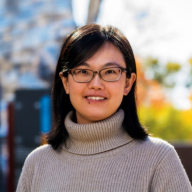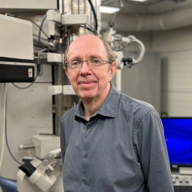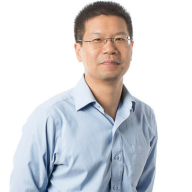Researchers
The Centre for NanoScience Research comprises faculty members from the Department of Chemistry and Biochemistry, Department of Physics, and the Department of Chemical and Materials Engineering.
-
 Pablo Bianucci
Pablo Bianucci- Associate Professor, Physics
Research areas: Micro- and nano-photonics, semiconductor nanostructures, optics -
 George Bepete
George Bepete- Assistant Professor, Chemical and Materials Engineering
- Assistant Professor, Physics
Research areas: Nanomaterials for sustainable energy and next-generation electronics -
John Capobianco
- Professor, Chemistry and Biochemistry
- Honorary Concordia University Research Chair in Nanoscience
Research areas: Nanomaterials, upconversion, lanthanides, bioimaging, drug delivery, photodynamic therapy, physical inorganic, optical spectroscopy, persistent luminescence. -
 Louis Cuccia
Louis Cuccia- Graduate program director, Chemistry and Biochemistry
- Professor, Chemistry and Biochemistry
-
 Christine DeWolf
Christine DeWolf- Professor , Chemistry and Biochemistry
- Co-Director, Centre for NanoScience Research
- Vice-Dean, Faculty of Arts and Science
Research areas: biophysical chemistry, model membranes, Langmuir monolayers, liposomes, environmental pollutants, nanopatterning, lipid-protein interactions -
 Pat Forgione
Pat Forgione- Professor, Chemistry and Biochemistry
Research areas: Organic Chemistry, Green Chemistry, Medicinal Chemistry, Catalysis, Drug Discovery, Biomass, Anti-Cancer Agents, Materials Chemistry -
 Marc-Antoni Goulet
Marc-Antoni Goulet- Assistant Professor, Chemical and Materials Engineering
Research areas: Flow batteries, Fuel cells, Electrosynthesis, Electrochemical sensors, Electrochemistry fundamentals -
 Melanie Hazlett
Melanie Hazlett- Associate Professor and Undergraduate Program Director, Chemical and Materials Engineering
Research areas: environmental catalysis, sustainable processes, green fuel production, heterogeneous catalysis -
 Ashlee J. Howarth
Ashlee J. Howarth- Associate Professor and Concordia University Research Chair, Chemistry and Biochemistry
Research areas: Inorganic Materials Chemistry, Metal–Organic Frameworks (MOFs), Rare-Earth Cluster-Based MOFs, Porous Materials, Materials Design, Adsorbents, Catalysts, Photoluminescent Materials, Green Chemistry. -
 Sana Jahanshahi Anbuhi
Sana Jahanshahi Anbuhi- Associate Professor and Graduate Program Director (GPD) PhD and MASc programs | Concordia University Research Chair Tier II in Stable Bio/Chemo-Sensors, Chemical and Materials Engineering
Research areas: Paper-based microfluidic devices, and fabrication of ready-to-use analytical devices for point-of-care diagnostic, bio-sensing, and on-site detection of analytes such as pesticides, heavy metals, microorganisms, etc. Thermal Stabilization of Biologics -
 Xia Li
Xia Li- Associate Professor, Chemical and Materials Engineering
- Concordia University Research Chair in High Energy Rechargeable Batteries
- Associate Director of Concordia Collaborative Centre on Energy and its Transition (C2ET)
Research areas: Energy storage and conversion, nanomaterials and nanotechnology, Li-ion batteries, Li-sulfur batteries, solid-state batteries, solid-state electrolytes, synchrotron radiation, in-situ characterization techniques -
 Marek B. Majewski
Marek B. Majewski- Associate Professor, Chemistry and Biochemistry
Research areas: Inorganic chemistry, solar energy conversion, artificial photosynthesis, photochemistry, photocatalysis, optical spectroscopy -
 Rafik Naccache
Rafik Naccache- Associate Professor and CURC Tier II in Sustainable Multifunctional Nanomaterials, Chemistry and Biochemistry
Research areas: Nanoparticle synthesis, materials characterization, carbogenic quantum dots, metallic nanoparticles, plasmonics, sensors, imaging, nanothermometry, drug delivery -
Nhat Truong Nguyen
- Assistant Professor, Chemical and Materials Engineering
Research areas: Nanomaterials, photocatalysis, CO2 conversion, H2 generation, renewable fuels -
 Jung Kwon (John) Oh
Jung Kwon (John) Oh- Full Professor, Chemistry and Biochemistry
Research areas: Organic and polymer chemistry, Polymer synthesis and characterization, Materials science, biomedical applications, drug delivery -
 Ingo Salzmann
Ingo Salzmann- Associate Professor, Chemistry and Biochemistry
- Associate Professor, Physics
Research areas: Conjugated organic molecules and polymers employed as organic (semi-)conductors; their structural, electronic and optical properties; applications in organic electronics -
 Cameron Skinner
Cameron Skinner- Associate Professor , Chemistry and Biochemistry
Research areas: Analytical chemistry with particular focus on electrophoretic separations, bioanalysis, biomarker discovery and forensics -
 Michel Laurent Trudeau
Michel Laurent Trudeau- Professor, Chemical and Materials Engineering
Research areas: - Hydrogen Research - Hydrogen Storage - Hydrogen Economics - Hydrogen Embrittlement - Nanomaterials - Materials Characterization - Microscopy -
-
 Zhibin Ye
Zhibin Ye- Professor, Chemical and Materials Engineering
Research areas: Polymer materials;materials for energy storage and conversion; nanostructured metal nanoparticles for catalysis and biomedical applications; heterogeneous catalysis; advanced polymerization technologies; catalytic olefin polymerization; transition metal catalysts; polymers of complex architectures -
 Valter Zazubovits
Valter Zazubovits- Professor, Physics
- Chair, Physics
Research areas: Photosynthesis research using optical methods. Energy and charge transfer. Protein dynamics. Tunneling in biological systems. Explosives detection. Novel microscopy and single-molecule imaging techniques.
Maritza Volel
- Professeure et chercheuse en chimie
Spécialiste en chimie des matériaux, Collège Montmorency
Research areas: Eco-design of advanced materials, membranes (films, selective capture, encapsulation, controlled release), bio-based materials, nanostructures, optimized food formulations, upcycling of waste materials (polymers, ceramics, composites, organic matter, etc.).